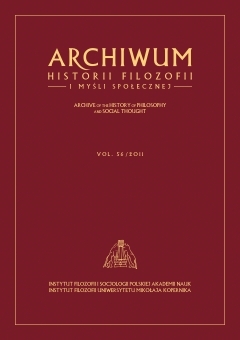From Etymology to Ethnology. On the Development of Stoic Allegorism
From Etymology to Ethnology. On the Development of Stoic Allegorism
Author(s): Mikołaj DomaradzkiSubject(s): Philosophy of Language, Cultural Anthropology / Ethnology
Published by: Instytut Filozofii i Socjologii Polskiej Akademii Nauk
Keywords: Stoics; Zeno; Cleanthes; Chrysippus; Cornutus; etymology; ethnology; allegoresis;
Summary/Abstract: The purpose of the present article is to show that there is a clear line of continuity between the early Stoics’ and Cornutus’ works, as all of them assumed that the ancient mythmakers had transformed their original cosmological conceptions into anthropomorphic deities. Hence, the Stoics from Zeno to Cornutus believed that the names of the gods reflected the mode of perceiving the world that was characteristic of the people who named the gods in this way. Accordingly, the major thesis advanced in the paper proposes that the Stoics conducted their etymological analyses so as to gather ethnographical information about the origin and development of the existing religion. When doing so, they treated the conventional mythological narratives as sources of information about the early conceptions of the cosmos. Thus, the Stoics from Zeno to Cornutus employed etymology as a certain research strategy: they analyzed the names of traditional deities so as to extract the physical and moral beliefs that constituted the ancients’ world picture. Treated as ethnologists, the Stoics seem to equate piety with retrieving philosophical truths obscured under the guise of primitive mythical formulations. Furthermore, when unrevealing the original worldview inadvertently transmitted by the poets in their poems, the Stoics reconstruct the history of religion and contribute to the development of ancient anthropology
Journal: Archiwum Historii Filozofii i Myśli Społecznej
- Issue Year: 56/2011
- Issue No: 56
- Page Range: 81-100
- Page Count: 20
- Language: English

